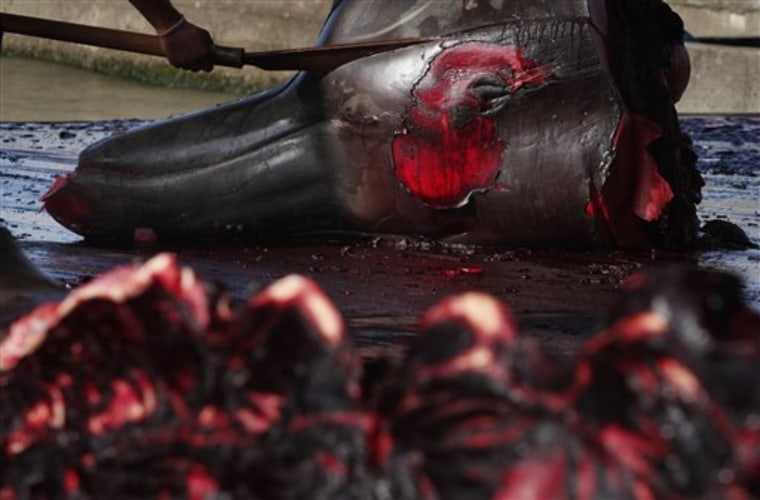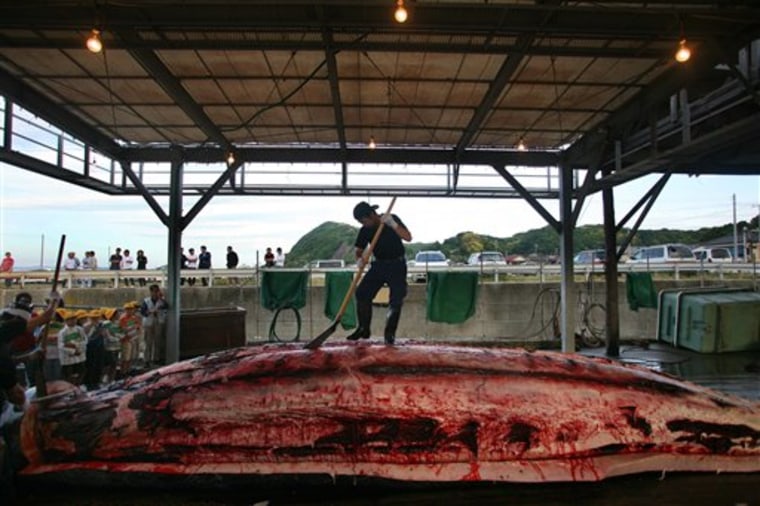With knives sharpened and school kids watching, one of Japan's coastal whaling towns butchered its first catch of the season Thursday — and defended the practice against international criticism.
The team in the village southeast of Tokyo pulled two Baird's beaked whales caught the day before onto a landing station with pulleys and ropes, and chopped them into bricks of meat and blubber for sale.
It was Wada's first catch since the International Whaling Commission rejected a Japanese proposal in May to grant its coastal whalers rights to expand their catches, and the whalers here were angry.
Yoshinori Shoji, head of Wada's Gaibo Hogei whaling company, argued that whales should be managed like any other natural resource, and he rejected anti-whaling arguments that the animals should be protected at all costs.
"We have taken this whale just 20 kilometers (12 miles) off this coast, and American and European people come here and 'Stop!'" he said. "Can they interfere so easily?"
Tradition since 1600s
Japanese hunters have caught Baird's beaked whales on the Boso Peninsula, where Wada is located, since the early 1600s. Shoji himself is a third-generation whaler.
But international restrictions on the types and numbers of whales that can be caught have dealt a major blow to Wada and three other Japanese towns that host whalers.
Japan has fought for years against a 1986 International Whaling Commission moratorium on commercial whaling, but anti-whaling nations — including the United States, Australia and Britain — have blocked Tokyo's efforts to win more hunting rights for its whalers.
These days, Japan's government limits coastal whalers to a total of 66 whales a year, and Shoji's company has rights to 14 of them, he said. The coastal program is separate from the 1,000 whales that Japan catches under a scientific program sanctioned by the IWC.
In an effort to keep the old tradition — and business — alive, Wada invites local children to watch the first butchering of the season. On Thursday, about 50 fifth graders gathered around the whaling station to watch.
"It's not enough to explain it to them — we want them to see it," said Akiji Ichihara, a restaurant owner who prepared whale for the children to eat. "It's our food culture. You can't decide for other people what they can eat."
Child's view: 'Kind of gross'
Like any butchering operation, the show at Wada was a bloody one.

The water in the inlet plumed red as the whale carcass was pulled onto the station platform at dawn. A researcher from Japan's Fisheries Agency measured the whale and took samples as men in rubber boots and gloves sliced into its flesh, using hooks, chains and a winch to peel thick strips of blubber from the body.
Gallons of blood gushed from the body as the workers cut deep for meat and sliced away the heart and lungs. Nothing is wasted _ the meat is sold as food and the bones and innards are used as fertilizer.
The children watched with a mixture of fascination and nausea.
"I've seen this 10 times!" boasted Ryunosuke Nakayama, 10. "But it's kind of gross."
Fried whale breakfast
After the butchering, the children gathered at a local community hall for a breakfast of fried whale, rice balls and watermelon.
Indeed, food is at the center of Japan's whaling history. The business was expanded on an industrial scale in the early 20th century, and whale meat boomed as a valued and plentiful source of protein in the dire years after Japan's defeat in World War II.
The popularity of whale meat, however, has plummeted as other meats became available and the IWC moratorium drove up the price and cut the supply. But Shoji's men did a brisk business Thursday morning as restaurant owners and a cluster of elderly residents lined up to buy.
Shoji said a typical whale can earn about $40,000. The meat on Thursday sold for between $7.50 and $10.50 per pound, depending on the cut.
Elderly customers said eating whale was as natural as eating any other meat.
"It's great as a snack to drink with alcohol," said Fumie Yoshida, 79, as she chatted about the many ways to cook the meat. "I ate a lot of it — that's how I got so fat!"
